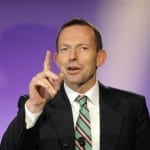Two of China’s – and the world’s – biggest renewable energy manufacturers have called out the Australian Government for the instability surrounding the Renewable Energy Target, and warned it over sovereign risk.
Yingli Green Energy and Goldwind Australia, Chinese based solar and wind providers respectively, have written submissions to the RET review panel highlighting not only the impact the RET has on domestic operation but also international strategic decisions.
Goldwind Australia, the largest wind turbine supplier in the Chinese market and the second largest in the world, said it had set up business in Australia due to the attractiveness of the RET, and its bipartisan support. It has almost $400 million of projects built or nearly complete within Australia and a further $800 million in the pipeline.
Goldwind used Prime Minister Tony Abbott’s own words – at a recent Australia Week lunch in Shangai, China in April of this year – to defend the target.
Here is what Goldwind quoted Abbott as saying at the time.
“Few are aware that total Chinese investment in Australia, at about $60 billion, is only a little less than total Chinese investment in the United States. Far more than trade, investment in another country is a sign of trust. You don’t put your hard-earned cash into another country unless you are absolutely certain that your investment will be respected, that you are likely to make a reliable profit and that you will be able to repatriate the money. The fact that China has invested almost as much in our economy, as it has in an economy ten times our size, is a sign of trust in Australia.”
Goldwind said that it was one of the Chinese investors “that have trusted the Australian investment environment.” It noted: “A key factor in foreign investment decisions is consideration of country risk and the ability to rely on the country law. ”
Goldwind, which has 19,000MW of wind across the world, said it has established offices in Sydney and Melbourne, and had nearly 40 employees in Australia. Finance for its project had come mostly from China, but the majority of suppliers came fro Australia.
It said the RET program had been successful and “only the most competitive projects” were being constructed, and at least cost.
“This multi-faceted competitive renewable energy market has proven to be a highly competitive delivery mechanism for renewable energy to meet the target.”
A sustained RET would, according to Goldwind, continue overseas investment into the sector, ensure emissions targets are met, extend costs over longer periods allowing transfer into a competitive market, ensure companies in development stage have future stability.
Meanwhile, Yingli, the world’s largest solar panel manufacturers with more than 30 million panels installed over fifty countries, said the RET was crucial for ongoing business and future stability, and to address climate issues. It noted the most recent IPCC report and the issue of greenhouse gas emissions, especially seeing as almost 40 per cent are caused by the electricity, gas and water sectors within Australia.
It said far from being a leader, Australia now risked being a laggard in international circles.
“For many years Australia has claimed that it was in danger of leading the pack in its attempts to reduce GHGs (greenhouse gases),” Yingli wrote.
“However, given the increasing commitments made by other countries (eg more than 70 countries around the world have put in place targets and policies to support the development of renewable energy technologies, Australia is now a laggard in this area.”
It cited the UK government’s commitment to 30 per cent renewable energy by 2020).
It also said that claims of falling demand did not take into account that many homes and businesses were simply finding a new way to generate energy.
“These trends fail to include offgrid generation and rooftop solar which would add significantly to the total electricity consumption. In fact many Australians are not using less electricity, they are just buying less from retailers.
“One of the rationales for reducing the RET is that the 41,000 GW no longer represents 20% of the country’s electricity usage. We argue that while total electricity demand may be falling, it is falling at a much lower rate than the AEMO figures suggest.”
Yingli also suggested that solar would help manufacturers manage energy bills.
“Yingli Green Energy have been involved with a number of Australian manufacturers who have installed solar systems, significantly reducing business risk and giving them the certainty to plan for expansion,” it wrote.
“Solar energy is particularly efficient for the manufacturing sector, given its peak production happens during the day when energy consumption is often at its highest.
“The removal of the RET would only put these productivity gains further out of reach for the sector, something which is likely to further reduce their cost competiveness.










